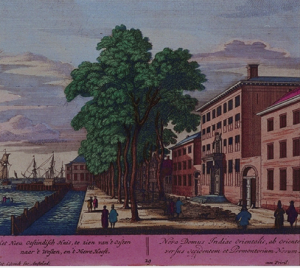[:nl]
Historical background
Rotterdam was in many ways a key player in the Dutch slavery past. The most immediate area of engagement was through slave trading as carried out by the Rotterdam firm Coopstad & Rochussen.
With the expiration of its monopoly on the slave trade in the eighteenth century, the West India Company (WIC) passed the slave trading rights on to Coopstad & Rochussen, hereby signaling the inception of the transportation of 20,000 slaves in fewer than thirty years, in hardly-ventilated holds via treacherous routes from the West African Coast to the New World. Suppliers of trading products and material/services, e.g. rope-makers and carpenters, could also profit indirectly from the activity in the Rotterdam harbors. Rotterdam was a major port for the import of American Virginia tobacco, mainly produced through slave labor.
Notwithstanding the post-eighteenth century termination of slave transports, Rotterdam retained its status of a city of interest in relation to slavery heritage. Unlike Great Britain and France, the Netherlands did not have a broader popular anti-slavery movement. One of the few anti-slavery civil initiatives came from Rotterdam. A signed petition was presented to King Willem II by 128 women from The Rotterdam Ladies Anti-Slavery Committee – largely coming from the more international English speaking zones of the city.
Traces
Many people with Afro-Caribbean heritage live in Rotterdam. The largest group of Antilleans in The Netherlands, live in Rotterdam. Their presence is for instance expressed through the popular annual Caribbean Carnival, which attracts nearly a million visitors during peak years.
In June 2013 a monument for the commemoration of slavery was revealed on the Lloyd Pier, a prominent location where in past centuries ships embarked for the slaverytrade. In the city center of Rotterdam, many buildings with a direct connection to this history have vanished Many buildings have been bombarded by the Germans in World War II.
[:]



